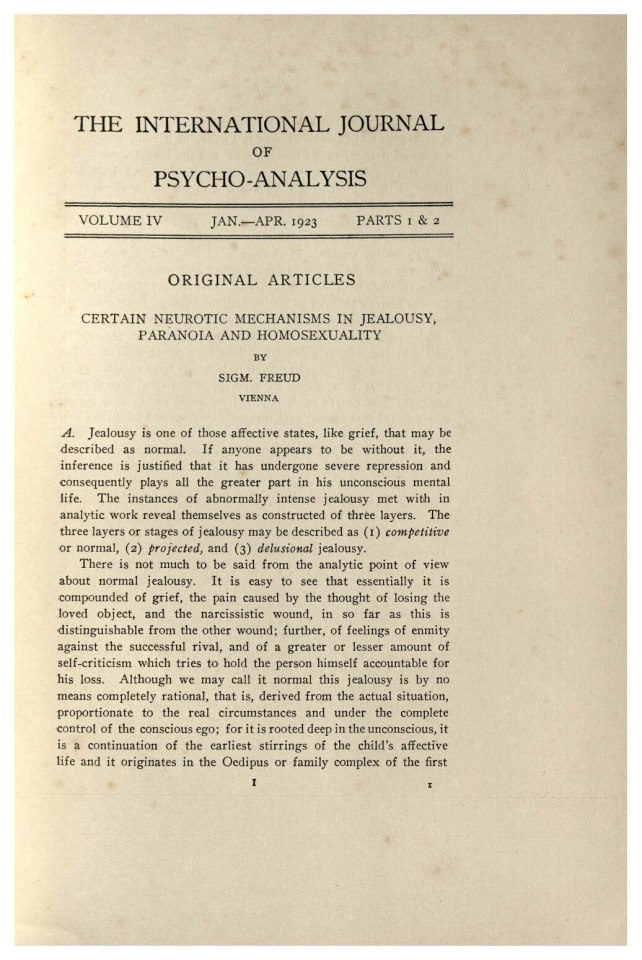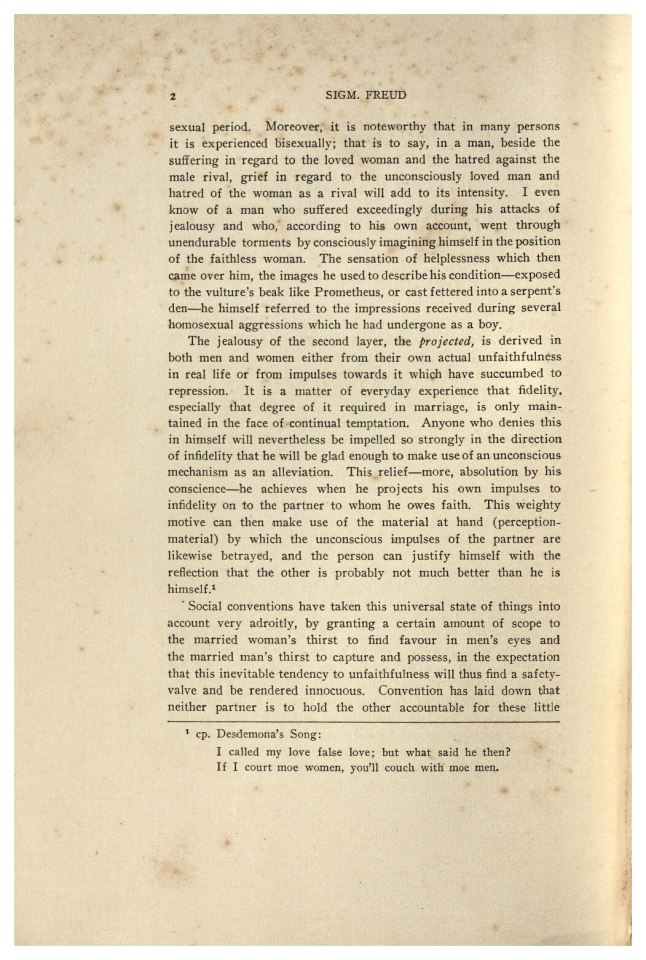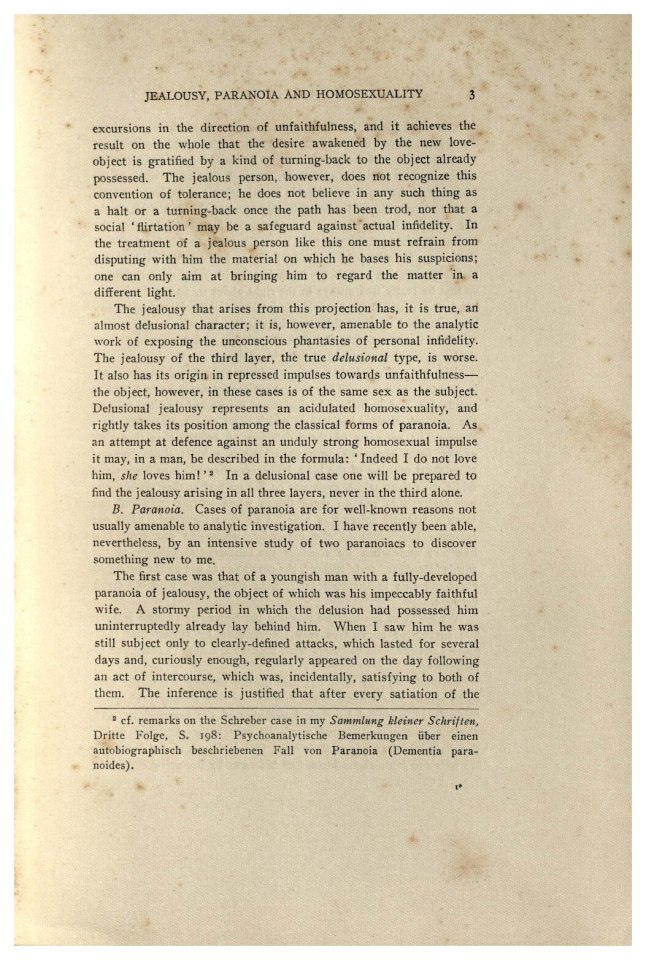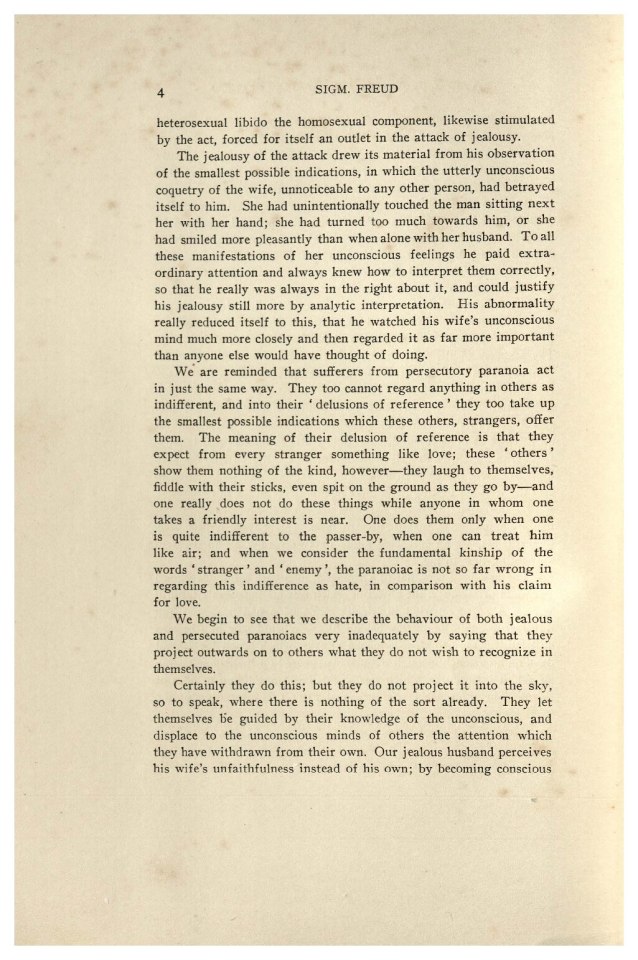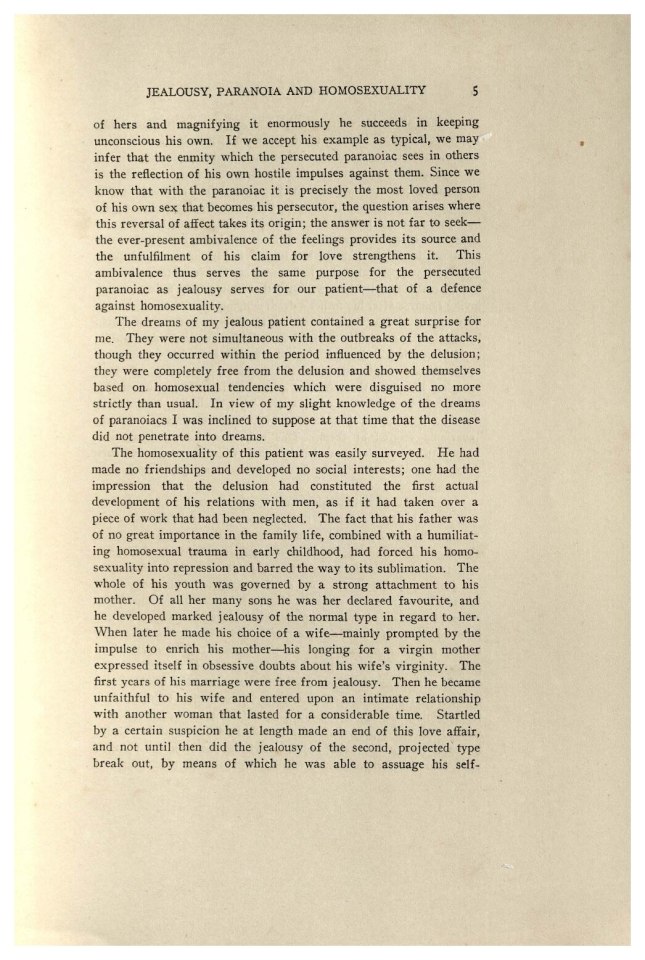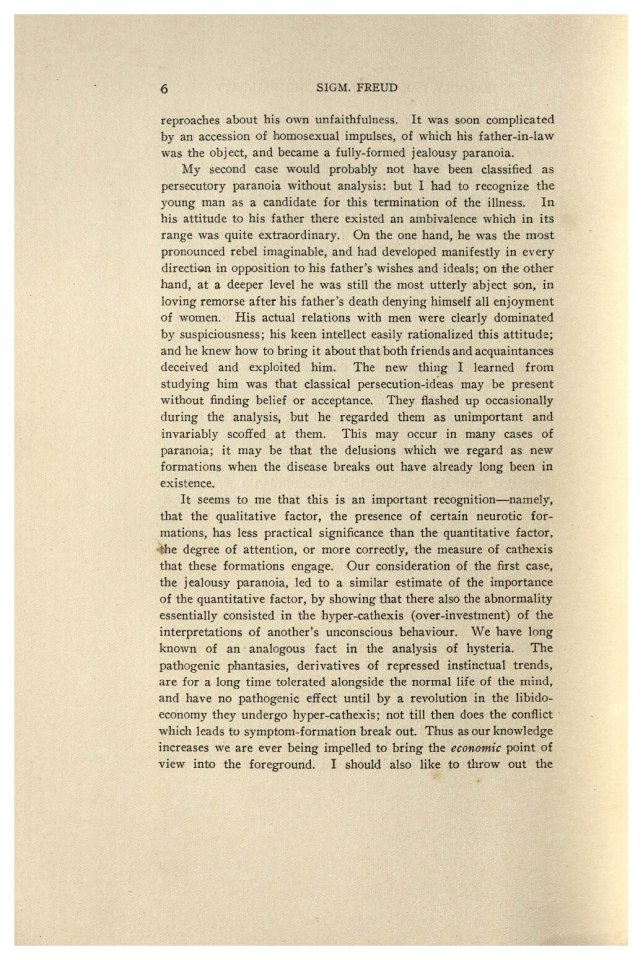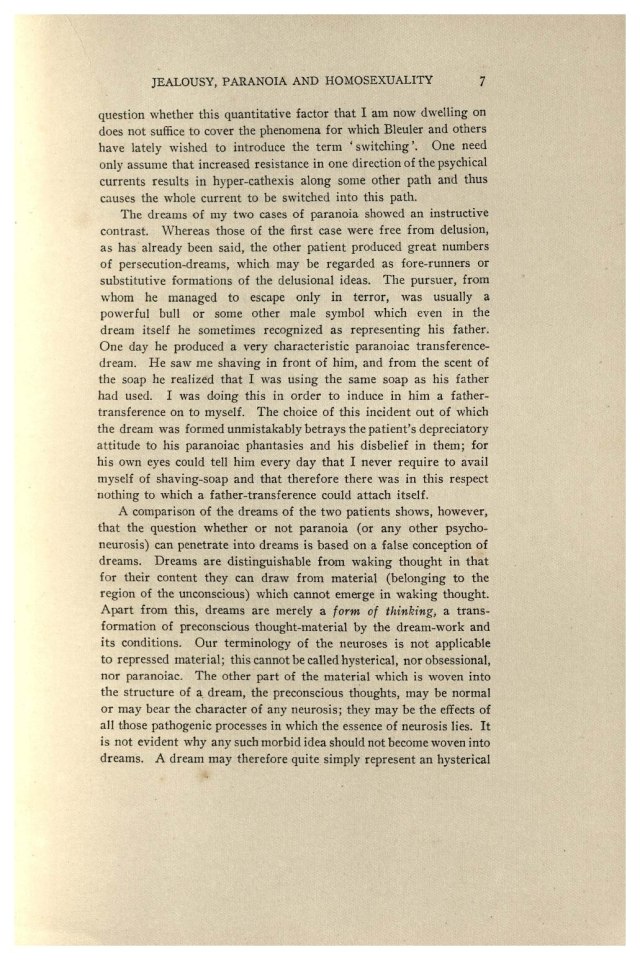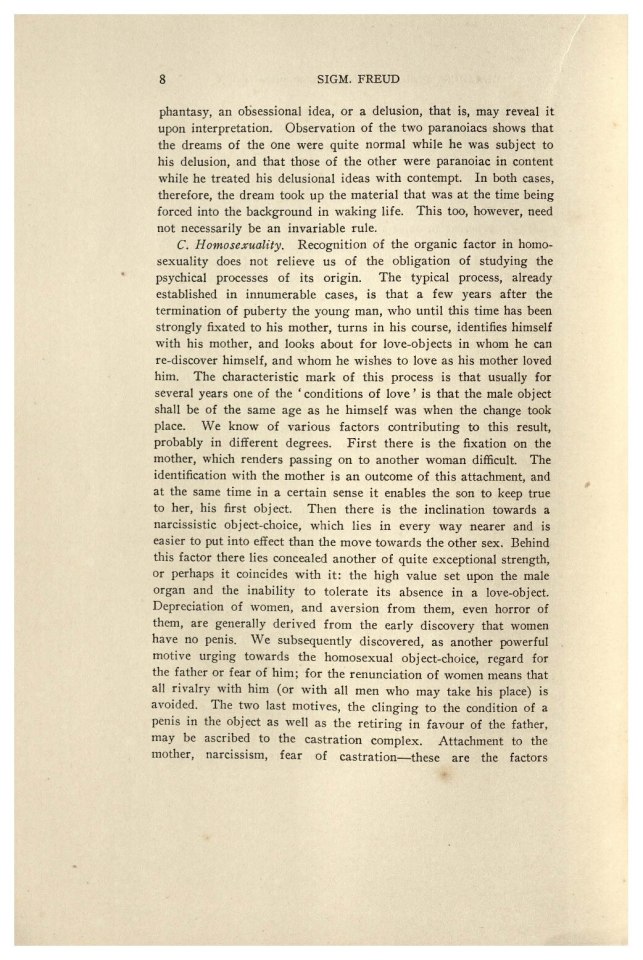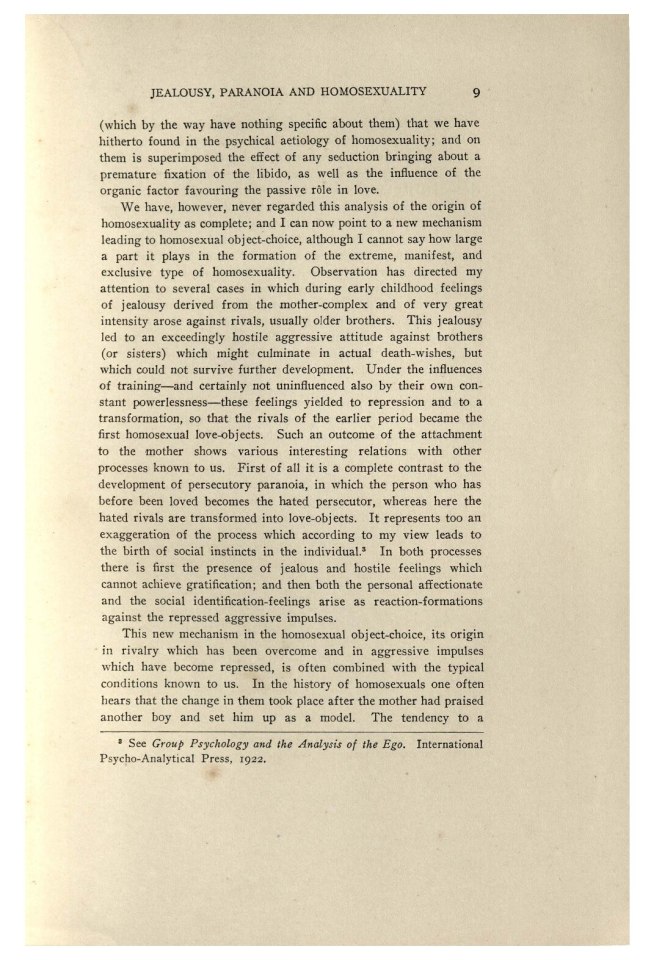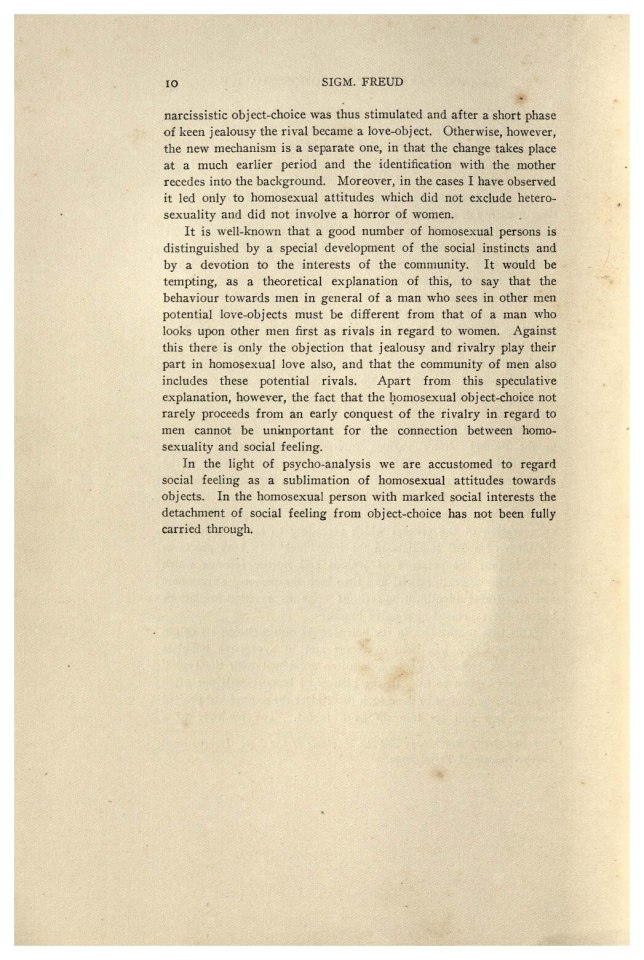S.
THE INTERNATIONAL JOURNAL
OF
PSYCHO-ANALYSIS
VOLUME IV JAN.—APR. 1923 ° PARTS ı 82ORIGINAL ARTICLES
CERTAIN NEUROTIC MECHANISMS IN JEALOUSY,
PARANOIA AND HOMOSEXUALITYBY
SIGM. FREUD
VIENNAA. Jealousy is one of those affective states, like grief, that may be
described as normal. If anyone appears to be without it, the
inference is justified that it has undergone severe repression and
consequently plays all the greater part in his unconscious mental
life. The instances of abnormally intense jealousy met with in
analytic work reveal themselves as constructed of three layers. The
three layers or stages of jealousy may be described as (I) competitive
or normal, (2) projected, and (3) delusional jealousy.There is not much to be said from the analytic point of view
about normal jealousy. It is easy to see that essentially it is
compounded of grief, the pain caused by the thought of losing the
loved object, and the narcissistic wound, in so far as this is
distinguishable from the other wound; further, of feelings of enmity
against the successful rival, and of a greater or lesser amount of
self-criticism which tries to hold the person himself accountable for
his loss. Although we may call it normal this jealousy is by no
means completely rational, that is, derived from the actual situation,
proportionate to the real circumstances and under the complete
control of the conscious ego; for it is rooted deep in the unconscious, it
is a continuation of the earliest stirrings of the child’s affective
life and it originates in the Oedipus or family complex of the firstı ı
S.
2 . “ SIGM.FREUDD a
sexual period, Moreover;it is noteworthy that in many persons
it is experienced Bisexually; that’is to say, in a man, beside the
suffering in regard to the loved woman and the hatred against the
male rival, grief in regard to the unconsciously loved man and
hatred of the woman as a rival will add to its intensity. I even
know of a man who suffered exceedingly during his attacks of
jealousy and who," according to his own account, went through
unendurable torments by consciously imaginitig.himself in the position
of the faithless woman. The sensation of helplessness which then
came over him, the images he used to describe his condition — exposed
to the vulture’s beak like Prometheus, or cast fettered into a serpent's
den—he himself referred to the impressions received during several
homosexual aggressions which he had undergone as a boy.The jealousy of the second layer, the projected, is derived in
both men and women either from their own actual unfaithfulness
in real life or from impulses towards it which have succumbed to
repression. It is a matter of everyday experience that fidelity,
especially that degree of it required in marriage, is only main-
, tained in the face of«continual temptation. Anyone who denies thisin himself will nevertheless be impelled so strongly in the direction
of infidelity that he will be glad enough to make use of an unconscious
mechanism as an alleviation. This reliee—more, absolution by his
conscience—he achieves when he projects his own impulses to
infidelity on to the partner to whom he owes faith. This weighty
motive can then make use of the material at hand (perception-
material) by which the unconscious impulses of the partner are
likewise betrayed, and the person can justify himself with the
reflection that the other is probably not much better than he is
himself.t"Social conventions have taken this universal state of things into
account very adroitly, by granting a certain amount of scope to
the married woman’s thirst to find favour in men’s eyes and
the married man’s thirst to capture and possess, in the expectation
that this inevitable tendency to unfaithfulness will thus find a safety-
valve and be rendered innocuous. Convention has laid down that
neither partner is to hold the other accountable for these little1 cp. Desdemona’s Song:
I called my love false love; but what, said he then?
If I court moe women, yowIl couch with! moe men,# =”
|
S.
excursions in-the.
result on the wi
object is gratified b;once the path has! been trod,. nor
arsafeguard against”actual infidelity. ‚In
the treatment öf a ‚son like this one must refrain from
disputing with him the material on which he bases his suspicic
one can only aim at bringing ‚him to regard the matter
different light. “
. The jealousy that arises : from this projection‘ has, it is true,an _
almost delusional character; it is, however, amenable to the analytie
work of exposing the unconscious ‚phantasies of personal infidelity.
The jealousy of the third layer, the true delusional type, is worse.
It also has its ori, repressed impulses towards unfaithfulness—
the object, however, these ı cases is of the same sex as the subject. .
Delusional jealousy represents an acidulated homosexuality, and
rightly täkes its position among the classical forms of paranoia. As;
an attempt at defence against an unduly strong homosexual impulse
it may, in a man, be described in the formula: “Indeed I do not love
him, she loves him!’® Ina delusional case one will be prepared to
find the jealousy arisiny three layers, never in the third alone. Et :
B. Paranoia. Cases tanoia are for well-known reasons not e. EREBE a
usually amenable > analı gation. I’have recently been able, - : ;social “flirtatic
still subject only to cl
days and, curiously enou;
an act of intercourse, whi
them. The inference? cf. remarks on the S
Dritte Folge, S. 198:
utobiographisch buairtbai
Beides).. a
»S.
4 SIGM. FREUD
heterosexual libido the homosexual component, likewise stimulated
by the act, forced for itself an outlet in the attack of jealousy.The jealousy of the attack drew its material from his observation
of the smallest possible indications, in which the utterly unconscious
coquetry of the wife, unnoticeable to any other person, had betrayed
itself to him. She had unintentionally touched the man sitting next
her with her hand; she had turned too much towards him, or she
had smiled more pleasantly than when alone withher husband. Toall
these manifestations of her unconscious feelings he paid extra-
ordinary attention and always knew how to interpret them correctly,
so that he really was always in the right about it, and could justify
his jealousy still more by analytic interpretation. His abnormality
really reduced itself to this, that he watched his wife’s unconscious
mind much more closely and then regarded it as far more important
than anyone else would have thought of doing.We are reminded that sufferers from persecutory paranoia act
in just the same way. They too cannot regard anything in others as
indifferent, and into their ‘ delusions of reference’ they too take up
the smallest possible indications which these others, strangers, offer
them. The meaning of their delusion of reference is that they
expect from every stranger something like love; these ‘others’
show them nothing of the kind, however—they laugh to themselves,
fiddle with their sticks, even spit on the ground as they go by—and
one really does not do these things while anyone in whom one
takes a friendly interest is near. One does them only when one
is quite indifferent to the passer-by, when one can treat him
like air; and when we consider the fundamental kinship of the
words “stranger ’ and ‘enemy’, the paranoiac is not so far wrong in
regarding this indifference as hate, in comparison with his claim
for love.We begin to see that we describe the behaviour of both jealous
and persecuted paranoiacs very inadequately by saying that they
project outwards on to others what they do not wish to recognize in
themselves.Certainly they do this; but they do not project it into the sky,
so to speak, where there is nothing of the sort already. They let
themselves be guided by their knowledge of the unconscious, and
displace to the unconscious minds of others the attention which
they have withdrawn from their own. Our jealous husband perceives
his wife’s unfaithfulness instead of his own; by becoming consciousS.
JEALOUSY, PARANOIA AND HOMOSEXUALITY 5
of hers and magnifying it enormously he succeeds. in keeping
unconscious his own, If we accept his example as typical, we may
infer that the enmity which the persecuted paranoiac sees in,others
is the reflection of his own hostile impulses against them. Since we
know that with the paranoiac it is precisely the most loved person
of his own sex that becomes .his persecutor, the question arises where
this reversal of affect takes its origin; the answer is not far to seek—
the ever-present ambivalence of the feelings provides its source and
the unfulfilment of his claim for love strengthens it. This
ambivalence thus serves the same purpose for the persecuted
paranoiac as jealousy serves for our patient—that of a defence
against homosexuality.The dreams of my jealous patient contained a great surprise for
me. They were not simultaneous with the outbreaks of the attacks,
though they occurred within the period influenced by the delusion;
they were completely free from the delusion and showed themselves
based on. homosexual tendencies which were disguised no more
strictly than usual. In view of my slight knowledge of the dreams
of paranoiacs I was inclined to suppose at that time that the disease
did not penetrate into dreams.The homosexuality of this patient was easily surveyed. He had
made no friendships and developed no social interests; one had the
impression that the delusion had constituted the first actual
development of his relations with men, as if it had taken over a
piece of work that had been neglected. The fact that his father was
of no great importance in the family life, combined with a humiliat-
ing homosexual trauma in early childhood, had forced his homo-
sexuality into repression and barred the way to its sublimation. The
whole of his youth was governed by a strong attachment to his
mother. Of all her many sons he was her declared favourite, and
he developed marked jealousy of the normal type in regard to her.
When later he made his choice of a wife—mainly prompted by the
impulse to enrich his mother—his longing for a virgin mother
expressed itself in obsessive doubts about his wife’s virginity.. The
first years of his marriage were free from jealousy. Then he became
unfaithful to his wife and entered upon an intimate relationship
with another woman that lasted for a considerable time. Startled
by a certain suspicion he at length made an end of this love affair,
and not until then did the jealousy of the second, projected’ type
break out, by means of which he was able to assuage his self-S.
6 SIGM. FREUD
reproaches about his own unfaithfulness. It was soon complicated
by an accession of homosexual impulses, of which his father-in-law
was the object, and became a fully-formed jealousy paranoia.My second case would probably not have been classified as
persecutory paranoia without analysis: but I had to recognize the
young man as a candidate for this termination of the illness. In
his attitude to his father there existed an ambivalence which in its
range was quite extraordinary. On the one hand, he was the most
pronounced rebel imaginable, and had developed manifestly in every
directien in opposition to his father’s wishes and ideals; on the other
hand, at a deeper level he was still the most utterly abject son, in
loving remorse after his father’s death denying himself all enjoyment
of women. His actual relations with men were clearly dominated
by suspiciousness; his keen intellect easily rationalized this attitude;
and he knew how to bring it about that both friends and acquaintances
deceived and exploited him. The new thing I learned from
studying him was that classical persecution-ideas may be present
without finding belief or acceptance. They flashed up occasionally
during the analysis, but he regarded them as unimportant and
invariably scoffed. at them. This may occur in many cases of
paranoia; it may be that the delusions which we regard as new
formations when the disease breaks out have already long been in
existence,It seems to me that this is an important recognition —namely,
that the qualitative factor, the presence of certain neurotic for-
mations, has less practical significance than the quantitative factor,
he degree of attention, or more correotly, the measure of cathexis
that these formations engage. Our consideration of the first case,
the jealousy paranoia, led to a similar estimate of the importance
of the quantitative factor, by showing that there also the abnormality
essentially consisted in the hyper-cathexis (over-investment) of the
interpretations of another’s unconscious behaviour. We have long
known of an ‘analogous fact in the analysis of hysteria. The
pathogenic phantasies, derivatives of repressed instinctual trends,
are for a long time tolerated alongside the normal life of the mind,
and have no pathogenic effect until by a revolution in the libido-
economy they undergo hyper-cathexis; not till then does the conflict °
which leads to symptom-formation break out. Thus as our knowledge
increases we are ever being impelled to bring the economic point of
view into the foreground. I should also like to throw out theS.
JEALOUSY, PARANOIA AND HOMOSEXUALITY 7
question whether this quantitative factor that [am now dwelling on
does not suffice to cover the‘phenomena for which Bleuler and others
have lately wished to’ introduce the term switching’, One need
only assume that increased resistance in one direction of the psychical
currents results in hyper-cathexis ‚along some;other path and thus
causes the whole current to.be switched into this path.The dreams of my two cases .of paranoia showed .an instructive
contrast. Whereas those of the first case were free from delüsion,
as has already been said, the other patient produced great numbers
of persecution-dreams, which. may be regarded as fore-runners or
substitutive formations of the delusional ideas. ‘The pursuer, from
whom he managed to escape ‘only in terror, was usually a
powerful bull or some other male symbol which even in the
dream itself he sometimes recognized as representing his father.
One day he produced a very characteristic paranoiac transference-
dream. He saw me shaving in front of him, and from the scent of
the soap he realized that I was using the same soap as his father
had used. I was doing this in order to induce in him a father-
transference on to myself. The choice of this incident out of which
the dream was formed unmistakably betrays the patient’s depreciatory
attitude to his paranoiac phantasies and his disbelief in them; for
his own eyes could tell him.every day that I never require to avail
myself of shaving-soap and that therefore there was in this respect
nothing to which a father-transference could attach itself.A comparison of the dreams of the two patients shows, however,
that the question whether or not paranoia (or any other psycho-
neurosis) can penetrate into dreams-is based on:a false conception of
dreams. Dreams are distinguishable from. waking thought in that
for their content they: can'.draw from material (belonging to the
region of the unconscious) which‘ cannot emerge in waking thought.
Apart from this, dreams are merely a form. of thinking, a trans-
formation of preconscious:thought-material by the dream-work and
its conditions. Our terminology of the neuroses is not applicable
to repressed material; this cannot be called hysterical, nor obsessional,
nor paranoiac. The other part of the material which is woven into
the structure of a, dream, the preconscious thoughts, may be normal
or may bear the character of any neurosis; they may be the effects of
all those pathogenie processes in which the essence of neurosis lies. It
is not evident why any suchmorbid idea should not become woven intodreams. A dream may therefore quite simply’ represent an hysterical
*S.
8 SIGM. FREUD
phantasy, an obsessional idea, or a delusion, that is, may reveal it
upon interpretation. Observation of the two paranoiacs shows that
the dreams of the one were quite normal while he was subject to
his delusion, and that those of the other were paranoiac in content
while he treated his delusional ideas with contempt. In both cases,
therefore, the dream took up the material that was at the time being
forced into the background in waking life. This too, however, need
not necessarily be an invariable rule.C. Homosexuality. Recognition of the organic factor in homo-
sexuality does not relieve us of the obligation of studying the
psychical processes of its origin. The typical process, already
established in innumerable cases, is that a few years after the
termination of puberty the young man, who until this time has been
strongly fixated to his mother, turns in his course, identifies himself
with his mother, and looks about for love-objects in whom he can
re-discover himself, and whom he wishes to love as his mother loved
him. The characteristic mark of this process is that usually for
several years one of the “conditions of love’ is that the male object
shall be of the same age as he himself was when the change took
place. We know of various factors contributing to this result,
probably in different degrees. First there is the fixation on the
mother, which renders passing on to another woman difficult. The
identification with the mother is an outcome of this attachment, and
at the same time in a certain sense it enables the son to keep true
to her, his first object. Then there is the inclination towards a
narcissistic object-choice, which lies in every way nearer and is
easier to put into effect than the move towards the other sex. Behind
this factor there lies concealed another of quite exceptional strength,
or perhaps it coineides with it: the high value set upon the male
organ and the inability to tolerate its absence in a love-object.
Depreciation of women, and aversion from them, even horror of
them, are generally derived from the early discovery that women
have no penis. We subsequentiy discovered, as another powerful
motive urging towards the homosexual object-choice, regard for
the father or fear of him; for the renunciation of women means that
all rivalry with him (or with all men who may take his place) is
avoided. The two last motives, the clinging to the condition of a
penis in the object as well as the retiring in favour of the father,
may be ascribed to the castration complex. Attachment to the
mother, nareissism, fear of castration—these are the factorsS.
JEALOUSY, PARANOIA AND HOMOSEXUALITY 9
(which by the way have nothing specific about them) that we have
hitherto found in the ‚psychical aetiology of homosexuality; and on
them is superimposed the effect of any seduction bringing about a
premature fixation of the libido, as well as the influence of the
organic factor favouring the passive röle in love.We have, however, never regarded this analysis of the origin of
homosexuality as complete; and I can now point to a new mechanism
leading to homosexual object-choice, although I cannot say how large
a part it plays in the formation of the extreme, manifest, and
exclusive type of homosexuality. Observation has directed my
attention to several cases in which during early childhood feelings
of jealousy derived from the mother-complex and of very great
intensity arose against rivals, usually older brothers. This jealousy
led to an exceedingly hostile aggressive attitude against brothers
(or sisters) which might culminate in actual death-wishes, but
which could not survive further development, Under the influences
of training—and certainly not uninfluenced also by their own con-
stant powerlessness—these feelings yielded to repression and to a
transformation, so that the rivals of the earlier period became the
first homosexual love-objects. Such an outcome of the attachment
to the mother shows various interesting relations with other
processes known to us. First of all it is a complete contrast to the
development of persecutory paranoia, in which the person who has
before been loved becomes the hated persecutor, whereas here the
hated rivals are transformed into love-objects. It represents too an
exaggeration of the process which according to my view leads to
the birth of social instincts in the individual In both processes
there is first the presence of jealous and hostile feelings which
cannot achieve gratification; and then both the personal affectionate
and the social identification-feelings arise as reaction-formations
against the repressed aggressive impulses.This new mechanism in the homosexual object-choice, its origin
in rivalry which has been overcome and in aggressive impulses
which have become repressed, is often combined with the typical
conditions known to us. In the history of homosexuals one often
hears that the change in them took place after the mother had praised
another boy and set him up as a model. The tendency to a® See Group Psychology and the Analysis of the Ego. International
Psycho-Analytical Press, 1922.S.
10 SIGM. FREUD
. ®narcissistic object-choice was thus stimulated and after a short phase
of keen jealousy the rival became a love-object. Otherwise, however,
the new mechanism is a separate one, in that the change takes place
at a much earlier period and the identification with. the mother
recedes into the background. Moreover, in the cases I have observed
it led only to homosexual attitudes which did not exelude hetero-
sexuality and did not involve a horror of women.It is well-known that a good number of homosexual persons is
distinguished by a special development of the social instinets and
by a devotion to the interests of the community. It- would be
tempting, as a theoretical explanation of this, to say that the
behaviour towards men in general of a man who sees in other men
potential love-objects must be different from that of a man who
looks upon other men first as rivals in regard to women. Against
this there is only the objection that jealousy and rivalry play their
part in homosexual love also, and that the community of men also
includes these potential rivals.. Apart from this speculative
explanation, however, the fact that the homosexual object-choice not
rarely proceeds from an early conquest of the rivalry in regard to
men cannot be unimportant for the connection between homo-
sexuality and social feeling.In the light of psycho-analysis we are accustomed to regard
social feeling as a sublimation of homosexual attitudes towards
objects. In the homosexual person with marked social interests the
detachment of social feeling from object-choice has not been fully
carried through.
J_IV_1923_1-2
1
–10
